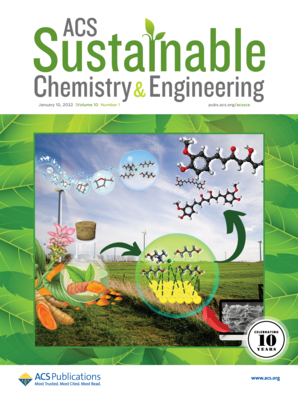Eco-Friendly Synthesis of Proton-Exchanged Lignin-Based Carbon Solid Acid for Efficient Conversion of High-Concentration Fructose to HMF
IF 7.1
1区 化学
Q1 CHEMISTRY, MULTIDISCIPLINARY
引用次数: 0
Abstract
Conventional sulfonation-derived carbon solid acids suffer from high energy consumption, equipment corrosion, and excessive acid usage. Here, a green proton-exchanged solid acid catalyst was developed to efficiently convert high-concentration fructose (15.6 wt %) into 5-hydroxymethylfurfural (HMF). The catalyst was synthesized by carbonizing a precursor formed from ammonium sulfate and sodium lignosulfonate (LS), followed by proton exchange. Carbonization at 350 °C preserved the −SO3Na functional group in the LS precursor, while ammonium sulfate promoted pore formation. The retained −SO3Na groups were subsequently converted to the −SO3H active sites of the catalyst by a proton-exchange reaction. The total acid density of the proton-exchanged solid acid catalyst reached 5.26 mmol/g. In the DMSO system, the proton-exchanged catalyst achieved 99% fructose conversion and 82% HMF yield under high fructose concentration. In addition, it maintained stable activity over 6 cycles. The strategy of incomplete carbonization and proton exchange of LS not only maintains the catalytic performance but is also a green and sustainable alternative to the sulfonation method.

质子交换木质素基碳固体酸的环保合成及高浓度果糖高效转化为HMF的研究
传统的磺化衍生碳固体酸存在高能耗、设备腐蚀和过量使用酸等问题。本研究开发了一种绿色质子交换固体酸催化剂,可将高浓度果糖(15.6 wt %)高效转化为5-羟甲基糠醛(HMF)。该催化剂是由硫酸铵和木质素磺酸钠(LS)形成的前驱体碳化,然后质子交换合成的。350℃炭化保存了LS前驱体中的- SO3Na官能团,而硫酸铵促进了孔隙的形成。保留的- SO3Na基团随后通过质子交换反应转化为催化剂的- SO3H活性位点。质子交换固体酸催化剂的总酸密度达到5.26 mmol/g。在DMSO体系中,质子交换催化剂在高果糖浓度下实现了99%的果糖转化率和82%的HMF产率。此外,它在6个周期内保持稳定的活动。LS的不完全碳化和质子交换策略不仅保持了催化性能,而且是一种绿色可持续的磺化替代方法。
本文章由计算机程序翻译,如有差异,请以英文原文为准。
求助全文
约1分钟内获得全文
求助全文
来源期刊

ACS Sustainable Chemistry & Engineering
CHEMISTRY, MULTIDISCIPLINARY-ENGINEERING, CHEMICAL
CiteScore
13.80
自引率
4.80%
发文量
1470
审稿时长
1.7 months
期刊介绍:
ACS Sustainable Chemistry & Engineering is a prestigious weekly peer-reviewed scientific journal published by the American Chemical Society. Dedicated to advancing the principles of green chemistry and green engineering, it covers a wide array of research topics including green chemistry, green engineering, biomass, alternative energy, and life cycle assessment.
The journal welcomes submissions in various formats, including Letters, Articles, Features, and Perspectives (Reviews), that address the challenges of sustainability in the chemical enterprise and contribute to the advancement of sustainable practices. Join us in shaping the future of sustainable chemistry and engineering.
 求助内容:
求助内容: 应助结果提醒方式:
应助结果提醒方式:


